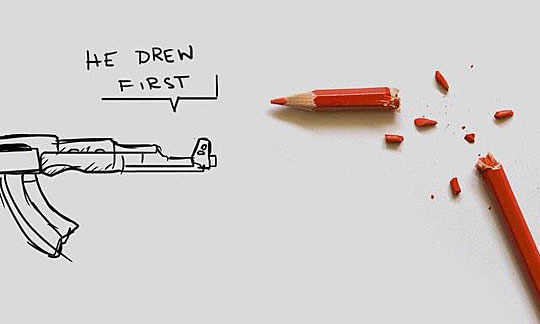I was actually going to write this post two weeks ago, following the Charlie Hebdo attacks on 7 January that rocked half of Europe – and quite possibly a good part of the remaining world.
I do not agree with what you have to say, but I will defend to the death your right to say it. – Voltaire
As much as I can relate to the epidemic of “Je suis Charlie” postings on Facebook I could not quite go along with it. Is it okay to ridicule someone else’s believes by publishing caricatures violating every inch of religious feeling? No, it most certainly is not. But it is of course even less okay to decide to go out and kill journalists just because you do not agree with what they are publishing. Just as the famous Voltaire quote goes freedom of speech only works when it is granted even to those we disagree with most.
So far for the regular European perspective; the notion of standing up and saying “enough is enough”. But for me, of course, there is more to it than meets the eye. And these things are right at the centre of the themes this blog has always been about: My connection to Israel and her people and my own identity as a European Pagan.
As far as the Israeli perspective goes the Charlie Hebdo attacks and the aftermath were a sad wake-up call that radical Islam is a force to be reckoned with even in the very heard of Europe. And to add insult to injury there was, of course, the whole Pallywood circus about how allegedly Mossad directed the attacks in order to blame radical Islam and stall peace talks in Israel. (What peace talks exactly that would be referring to right now and how it could stall them is, of course, a completely different question).
The sad truth is that Jews in Europe still do not feel safe. And sometimes I catch myself thinking that no, maybe they indeed should not. In France, I read the other day 50% of all racist attacks are directed against Jews who make only 1% of the population. At the moment there hardly seems to be a week going by without a Synagogue or other place frequented by Jews burning somewhere in Europe; 70 years after the end of Jewish prosecution in Europe Jews still rightfully feel they need extra security for their venues even though they are a tiny little group of “different” people against which there is little to no public outcry. Am I the only European who feels the people of Europe ought to be rallying behind their Jewish population just like they did behind the Charlie Hebdo victims? Yet when another Synagogue burns down it is hardly worth a front-page article in the local news.
“Do you know why I care so much about a tolerant Europe?”, I asked my mom the other day. It is because I am Pagan and chances are so will be my children. And with the rise of more self-confident second and third generation Paganism I am convinced that sooner or later we will also be more present in public life. A lot is already happening in the US in respect to recognition and protection of Pagan rights. Europe might right now be a calmer – and safer – place for a Pagan to live but eventually European Pagans, too, will become more visible.
Paganism is a completely different beast to all the religions we are struggling to deal with in European society right now. There is a relatively easy way of grasping who and what “the Christians”, “the Muslims”, “the Jews” and even “the Hindus” and “the Buddhists” are. It won’t be so simple with Paganism. We are a way more diverse group; we have no internal organisation worth speaking of; nobody that could speak for all or at least many of us. And of course we have a mindset that is becoming increasingly more different to that of followers of the Abrahamite religions. I see it in myself and also in may others in the Pagan blog sphere; once you have been Pagan for 15 or 20 years you start to feel how you think differently to non-Pagans; how your value system changes. The Wild Hunt for instance just recently posted an article about how Pagan religion afflicts the treatment of mental disorder but it is only a small spotlight on an increasingly different world view.
Coping with Paganism as a part of the intercultural mix that is Europe will be a challenge for our society. It will mean that people have to widen their horizons and look behind shared Abrahamite norms in order to allow Pagans in their midst. How are we going to accomplish that if European society cannot even cope with the variety Judaism and Islam add?
I feel that I need Europe to become more tolerant so I know my children and children’s children can be the self-confident, strong Pagans that I would want them to be. And ultimately, as sad as it is to think this way, I need Europe to become more tolerant so I will never have to fear for their safety and they will never have to hide their Pagan identity out of fear of prosecution.
– Migdalit
